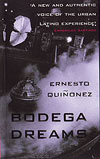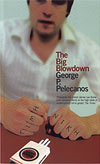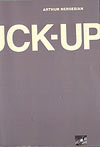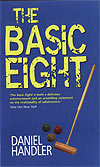Old and Cranky | |

| What's it all about eh? Sometimes you know I just think that the whole world is going mad. Actually I KNOW that the whole world is going crazy, it's just that more often than not these days I start to think it's all going downhill faster than ever, and when I think these things I ask myself am I just showing the signs of getting older and crankier and the answer is often, yes of course it is. Except: I find myself under more pressure than ever before to do and to do well. To be honest a lot of this is self-inflicted, and you know, as Morley famously said and as I have too often not-so-famously paraphrased 'what's the point in being bored?' But a similar question might be 'What's the point in being so knackered you can't do anything very well at all?' and the proof to the relevance of that question might actually be these very words. Is it just me, or has the world lost focus? Has the point to anything and possibly everything been lost along the way? And what way am I talking about, and was it ever clear, and did anything in the universe ever make more or less sense? I find myself asking myself these questions more often than at any other time since I was sixteen, which is to say a lifetime ago, and I'm not sure why this is the case. Maybe it's just natural. Maybe this is what happens when you reach this age. Maybe I am just losing my marbles. There's a great line in Ringolevio where Kenny Wisdom tells the inhabitants of his tenement block that he's just lost his marbles, incidentally, and Kevin of course is spot on in telling us all that it's a book to ring the changes through your life and you know if I got my way I'd be telling every kid in school to read it, and you know what? I think I actually will. Not that anyone will listen. They just tune you out… and they even admit this much. It's fair enough. I can't blame them. There's just too much information these days, and please accept my apologies for adding more to the pile. Rupert passed me a slim volume that addresses this very issue recently: Silence Descends by George Case is subtitled 'the end of the information age 2000 - 2500'. As that subtitle suggests, this is an imaginary historical document, charting the next half millennium, and if that seems as annoying a pretext to you as it originally did to me, then it's a feeling worth fighting because Silence Descends makes some very interesting points about our current infatuation with information. I wonder how many of the events here will occur as predicted, and how many will seem as the paranoid worrying of a techno-phobe? Of course it's impossible to say, but you'll have fun deciding which side of the line your own leanings currently lie. |

| These days I constantly find myself singing in my head the line in Baxendale's 'I Love the Sound of Dance Music' about Talya saying 'that I should get away for a little while' and then 'the voices in my head are singing (Boy you're losing it).' And as I do so I wonder if attraction is all about geometry; and as an extension of this I wonder if life is in fact ruled by geometry, and I start to consider that yes in fact it is. The Greeks would, I'm sure have agreed with this, and perhaps contemporary physicists and mathematicians might concur, but really I'm not that smart and my own considerations are based only on the shape of cheekbones. I think you can make a great deal of judgement about the world and the people in it by the shape of cheekbones. And noses. And the way in which the curvature of architecture meets the rectilinear. (And actually isn't Talya a great name?) In a sketchbook once I wrote (and this was recently) 'have affairs with your architecture.' I think this is a much overlooked element of life you know: the relationships we have with our built environment. We take it for granted too much, and that's partly why I concur with Rupert that The Image Of The City is such a great read. Of course I wrote my sketchbook warblings before reading Kevin Lynch's book, but it doesn't matter. No-one seems to have an original idea these days, least of all me. I love the start of Ringolevio (I love it all to be honest) partly because it is set in New York. I have come to be madly in love with the (idea of) New York, which you might rightly translate as being in love with the (idea of) Manhattan ever since reading Lawrence Block and his Matt Scudder novels. It seems a natural reaction, but other people have different natures and that's as it should be after all. For the last year or so though, a lot of things of importance to me seem to have centred on or circulated out of New York: the Scudder stories; Stephin Merritt; Dale Peck; Arthur Nersersian; Ernesto Qui'onez; friends with poetic hearts who light up the world; Daniel Handler. Actually I'm not even sure that Handler is a New Yorker, but he hangs with Merritt, Dudley Klute and L.D and there's more of them all in a moment and that's more than good enough for me. I'll start with Ernesto Qui'onez though because I was talking about Ringolevio, and it seems to me that in his first novel Bodega Dreams, Qui'onez has written a fantastically evocative and inspirational tale of a section of New York that Kenny Wisdom and his gang might have played Ringolevio against. It's the tale of Spanish Harlem, a tale of the heroism of criminal pride and idealism, a tale of falls from grace and the frittering away of dreams in the face of love and possibly lust, and how perhaps love overcomes and prevails but that maybe isn't enough in the scheme of things, especially if your scheme of things is the scheme of modern urban manipulation. It's a classic Noir tale with a curious twist, and it marks Qui'onez as a name to most definitely watch in the future. |

| A name to most certainly watch Now is George P. Pelecanos, and if it's been a year and a half since anything new appeared from him, at least there have been reissues to keep his ever growing readership happy. First there is The Big Blowdown, which sets the ball rolling in the DC Quartet of tales which include last years The Sweet Forever, the similarly reissued King Suckerman, and the forthcoming Shame The Devil. The Big Blowdown is the trailer to the series, if you like, going back in time to relate the events of the fathers of the characters who populate the later stories. It's something of an attempt at the Great American Novel, spanning generations as it does, and telling of the struggles to establish a sense of self within a culture and a country at constant odds with itself. That it doesn't quite work is meant as no serious criticism; it is good and right that Pelecanos should have made this attempt, but it's just that his later books manage to create a sense of pace and space that feels a great deal more original and inspiring. This is a book of a writer learning his trade, of a writer growing up in public. As an expert storyteller, Pelecanos naturally tells a great yarn here, but it's not the ideal Way In to the writer. For that you'd be better off with the republished The Sweet Forever, which is a gloriously angry and passionate book, or King Suckerman. Serpents Tail is the publishing house that brings us Pelecanos in the UK, and it's a great imprint, as I've said before. They do some great reprints of strange old books too, and it was more by luck than judgement that I picked up their publication of Gavin Lambert's Inside Daisy Clover. It's one of the best quick reads I've raced through ever, and deals with all the Pop issues you could wish for. As a witty treatise on the nature of Popism it's a treasure, the more so since it was written in 1963, and if you can read this book and insert, say, 'Debbie Gibson' or perhaps even 'Britney Spears' for dear ole Daisy Clover and not notice a great deal of difference, well that says a lot about both the prescience of Lambert and the unflinching solidity of the Pop Fame Game. Knock it and mock it, but you've just got to love it. |

| I once went into a store and picked up two books. Both had the word 'Fuck' in the title. I thought maybe the checkout operator would think I was trying to make some kind of sad 'rebel' stance; that I was under the impression that I was going to shock her. In truth I felt a bit embarrassed about it all and had considered going back a week later for the second book, but my fear of time and the fact that someone else might have swiped the book drove me forward. Oh, and the books in question happened to be Fucking Martin by Dale Peck and Arthur Nersesian's The Fuck Up. The Fuck Up is a hugely enjoyable romp through New York in the sad shoes of a character who is, to all intents and purposes, the fuck up of the title. Things just don't ever seem to go right for the poor chap, and even when they do, he rapidly finds some bizarre new way to short circuit his life and send it once more into a downward spiral. Of course there are inconsistencies, but I'm happy to chalk those up to being reflections of the culture, and anyway, this is most assuredly a tale of time and place and although the themes (hey, you never know where the finest people are to be found; sometimes they are the ones you least expect… don't trust appearances… ) are universal, this is essentially a book about New York and the curses of Modern Living. |

| Dale Peck's Fucking Martin was more of a disappointment, especially read in the wake of the enormously enjoyable Now It's Time To Say Goodbye. I first came across Peck's name courtesy of a New Yorker who, several years ago, expressed an intention to make a movie about the UK band Felt. He seemed to be very excited about the project and said that the screenplay was going to be written by Dale Peck. I filed the name for future reference, and was delighted therefore to find his books more readily available in New York than in Exeter… I picked up Now It's Time... on my last day in the city, and read it at leisure on returning. It is a scary and strange story which conjures thoughts of David Lynch and Carson McCullers; McCullers for her sharp depictions of character and place, Lynch for his eye for the odd and the bent out of shape. It's a novel that displays a masterful weaving of elements which essentially deal with divisions and the manner in which divisions breed fear and loathing, and it contains themes and characters that populate Peck's earlier work. As such, it's easy to see the previous work as developmental sketches for this novel, and reading Fucking Martin suggests this to be the case. I expect that those hooked early by Peck's work will derive great pleasure in following the developments in his writing, but I have to say that working backwards holds little pleasure. Fucking Martin reads as somewhat insubstantial in comparison to Now It's Time… and I have to suggest that newcomers cut straight to the chase and head for this later work. You won't be disappointed. |

| Another writer whose work I read in reverse order recently was Daniel Handler, although I'm rather more pleased to be able to report that with Handler the quality is fine whichever end of his career you choose to begin. Personally I started with his most recent novel Watch Your Mouth for the simple reason it was the only one that Amazon could get for me at the time, and it is a great read. Handler has allegedly said this book is his talking dirty book, which is quite funny because it isn't really, unless you consider the dirtiness of a golem created from the mud of a river bank to be dirty, which I guess it inevitably would be. It's a bizarre and somewhat hilarious tale that confronts many of the issues which I suspect are plaguing a generation worldwide who have grown up and older under the not so benevolent gaze of a mediated culture. Handler seems to accept that we cannot deny this element in our psyches, and strives to make a sense of this particularly in relation to the magical, timeless elements of life and love. Or should that be Life and Love. It would be so easy of course to come over all hippy sounding, which would blow it all completely of course, and it's to Handler's credit that he juggles the elements of magical mystique and referential cultural existence with such aplomb. It's quirky and clever without being smugly self-knowing, and you should read it today. Or tomorrow at the very least. If you do intend to read Watch Your Mouth tomorrow, then it would a great idea to read Handler's first novel The Basic Eight today. The Basic Eight is kind of like Square Pegs meets Heathers, and didn't The Waitresses do the theme to Square Pegs? I'm sure Handler would know, because Handler seems to be well clued up on his cultural references, and of course he dabbles in Pop himself, appearing on the Magnetic Fields opus 69 Love Songs (he also carried out the interview that graces the booklet which comes with the box set of that particular creation) and doesn't he perform as part of the Three Terrors alongside Merritt, LD Beghtol and Dudley Klute? But that would make four terrors, so maybe I'm mistaken, and maybe none of them can count. |

| Speaking of not being able to count, that is the basic premise for The Basic Eight, and if that sounds strange then all will be revealed when you pick up the book. Handler has written a fine novel that makes a mockery of the High School Experience; a book which knowingly references its genre and which throws in curve balls to keep things entertaining. Naturally there's unrequited love, drugs, death and the attendant parental and societal outrage, all of which serves to point out the hypocrisy of the world and how it sucks to be a teenager. All of which is being far too flippant but you know it's getting late and school starts again in three days time and there's always far too much to fit into the time allowed, and actually I'm now wondering if The Basic Eight really translates to the UK at all or if it just seems to because we seem to be so au fait with our cultural cousins across the Atlantic and if that even matters in the slightest. It probably does somewhere and there's an essay to be written but it can wait for another day, and another school holiday, or vacation, whichever you prefer. © Alistair Fitchett 2000 |
editor@tangents.co.uk